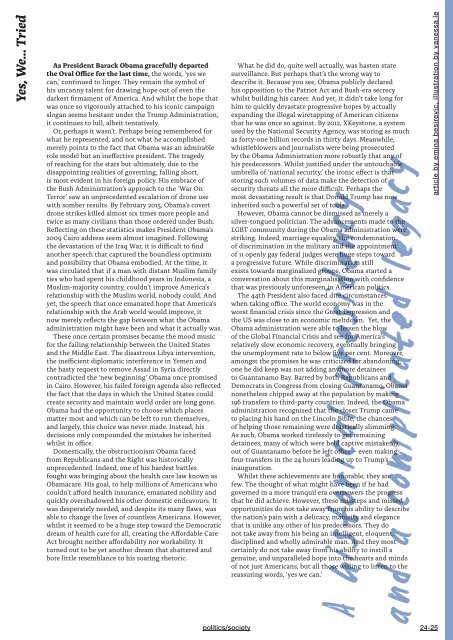Lot's Wife Edition 1 2017
Create successful ePaper yourself
Turn your PDF publications into a flip-book with our unique Google optimized e-Paper software.
Yes, We... Tried<br />
As President Barack Obama gracefully departed<br />
the Oval Office for the last time, the words, ‘yes we<br />
can,’ continued to linger. They remain the symbol of<br />
his uncanny talent for drawing hope out of even the<br />
darkest firmament of America. And whilst the hope that<br />
was once so vigorously attached to his iconic campaign<br />
slogan seems hesitant under the Trump Administration,<br />
it continues to lull, albeit tentatively.<br />
Or, perhaps it wasn’t. Perhaps being remembered for<br />
what he represented, and not what he accomplished<br />
merely points to the fact that Obama was an admirable<br />
role model but an ineffective president. The tragedy<br />
of reaching for the stars but ultimately, due to the<br />
disappointing realities of governing, falling short,<br />
is most evident in his foreign policy. His embrace of<br />
the Bush Administration’s approach to the ‘War On<br />
Terror’ saw an unprecedented escalation of drone use<br />
with somber results. By February 2015, Obama’s covert<br />
drone strikes killed almost six times more people and<br />
twice as many civilians than those ordered under Bush.<br />
Reflecting on these statistics makes President Obama’s<br />
2009 Cairo address seem almost imagined. Following<br />
the devastation of the Iraq War, it is difficult to find<br />
another speech that captured the boundless optimism<br />
and possibility that Obama embodied. At the time, it<br />
was circulated that if a man with distant Muslim family<br />
ties who had spent his childhood years in Indonesia, a<br />
Muslim-majority country, couldn’t improve America’s<br />
relationship with the Muslim world, nobody could. And<br />
yet, the speech that once emanated hope that America’s<br />
relationship with the Arab world would improve, it<br />
now merely reflects the gap between what the Obama<br />
administration might have been and what it actually was.<br />
These once certain promises became the mood music<br />
for the failing relationship between the United States<br />
and the Middle East. The disastrous Libya intervention,<br />
the inefficient diplomatic interference in Yemen and<br />
the hasty request to remove Assad in Syria directly<br />
contradicted the ‘new beginning’ Obama once promised<br />
in Cairo. However, his failed foreign agenda also reflected<br />
the fact that the days in which the United States could<br />
create security and maintain world order are long gone.<br />
Obama had the opportunity to choose which places<br />
matter most and which can be left to run themselves,<br />
and largely, this choice was never made. Instead, his<br />
decisions only compounded the mistakes he inherited<br />
whilst in office.<br />
Domestically, the obstructionism Obama faced<br />
from Republicans and the Right was historically<br />
unprecedented. Indeed, one of his hardest battles<br />
fought was bringing about the health care law known as<br />
Obamacare. His goal, to help millions of Americans who<br />
couldn’t afford health insurance, emanated nobility and<br />
quickly overshadowed his other domestic endeavours. It<br />
was desperately needed, and despite its many flaws, was<br />
able to change the lives of countless Americans. However,<br />
whilst it seemed to be a huge step toward the Democratic<br />
dream of health care for all, creating the Affordable Care<br />
Act brought neither affordability nor workability. It<br />
turned out to be yet another dream that shattered and<br />
bore little resemblance to his soaring rhetoric.<br />
politics/society<br />
What he did do, quite well actually, was hasten state<br />
surveillance. But perhaps that’s the wrong way to<br />
describe it. Because you see, Obama publicly declared<br />
his opposition to the Patriot Act and Bush-era secrecy<br />
whilst building his career. And yet, it didn’t take long for<br />
him to quickly devastate progressive hopes by actually<br />
expanding the illegal wiretapping of American citizens<br />
that he was once so against. By 2012, XKeystone, a system<br />
used by the National Security Agency, was storing as much<br />
as forty-one billion records in thirty days. Meanwhile,<br />
whistleblowers and journalists were being prosecuted<br />
by the Obama Administration more robustly that any of<br />
his predecessors. Whilst justified under the untouchable<br />
umbrella of ‘national security,’ the ironic effect is that<br />
storing such volumes of data make the detection of<br />
security threats all the more difficult. Perhaps the<br />
most devastating result is that Donald Trump has now<br />
inherited such a powerful set of tools.<br />
However, Obama cannot be dismissed as merely a<br />
silver-tongued politician. The advancements made to the<br />
LGBT community during the Obama administration were<br />
striking. Indeed, marriage equality, the condemnation<br />
of discrimination in the military and the appointment<br />
of 11 openly gay federal judges were huge steps toward<br />
a progressive future. While discrimination still<br />
exists towards marginalized groups, Obama started a<br />
conversation about this marginalisation with confidence<br />
that was previously unforeseen in American politics.<br />
The 44th President also faced dire circumstances<br />
when taking office. The world economy was in the<br />
worst financial crisis since the Great Depression and<br />
the US was close to an economic meltdown. Yet, the<br />
Obama administration were able to lessen the blow<br />
of the Global Financial Crisis and see for America’s<br />
relatively slow economic recovery, eventually bringing<br />
the unemployment rate to below five per cent. Moreover,<br />
amongst the promises he was criticized for abandoning,<br />
one he did keep was not adding anymore detainees<br />
to Guantanamo Bay. Barred by both Republicans and<br />
Democrats in Congress from closing Guantanamo, Obama<br />
nonetheless chipped away at the population by making<br />
196 transfers to third-party countries. Indeed, the Obama<br />
administration recognised that the closer Trump came<br />
to placing his hand on the Lincoln Bible, the chances<br />
of helping those remaining were drastically slimming.<br />
As such, Obama worked tirelessly to get remaining<br />
detainees, many of which were held captive mistakenly,<br />
out of Guantanamo before he left office – even making<br />
four transfers in the 24 hours leading up to Trump’s<br />
inauguration.<br />
Whilst these achievements are honorable, they are<br />
few. The thought of what might have been if he had<br />
governed in a more tranquil era overpowers the progress<br />
that he did achieve. However, these missteps and missed<br />
opportunities do not take away from his ability to describe<br />
the nation’s pain with a delicacy, maturity and elegance<br />
that is unlike any other of his predecessors. They do<br />
not take away from his being an intelligent, eloquent,<br />
disciplined and wholly admirable man. And they most<br />
certainly do not take away from his ability to instill a<br />
genuine, and unparalleled hope into the hearts and minds<br />
of not just Americans, but all those willing to listen to the<br />
reassuring words, ‘yes we can.’<br />
A historical presidency<br />
and a complicated legacy<br />
article by emina besirevic, illustration by vanessa le<br />
24-25

















